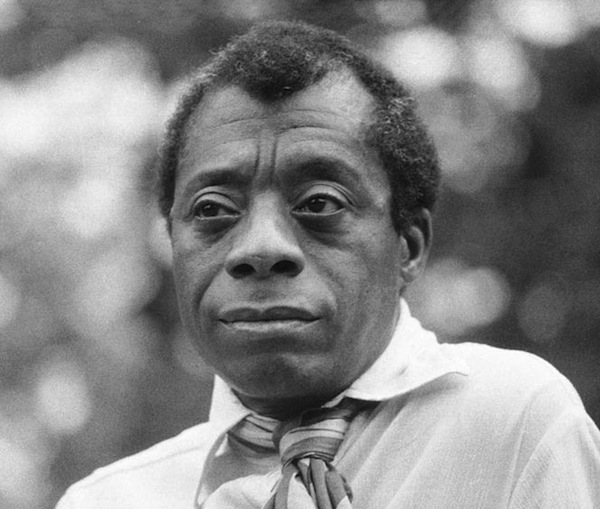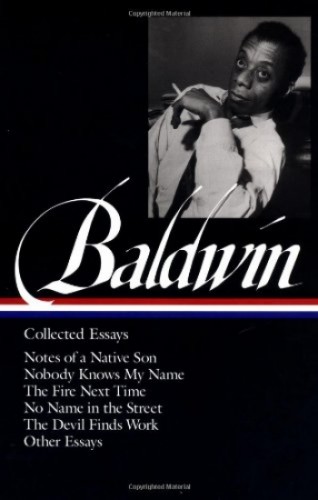Arts Commentary: Who’s Afraid Of James Baldwin?
So what we have is a failure of nerve — a reluctance to make students grapple with the considerable demands of James Baldwin’s prose and sensibility.
By Bill Marx
The gay African-American writer James Baldwin would have turned 90 this year and, according to a recent article in The New York Times, his work isn’t being assigned to high school students. That is not a good thing, given that he is among the finest essayists America has ever produced (Notes of a Native Son and The Fire Next Time,) as well as a powerful short story writer and novelist (Giovanni’s Room, Go Tell it to the Mountain). The reasons given by educators range “from the concern that he is too controversial and complex to the perception that he has been eclipsed by other African-American voices.” Some Baldwin supporters have taken notice.The New York Live Arts Festival just hosted James Baldwin, This Time, a series of panel discussions and readings that explored the author’s artistic legacy. The event kicks “off a yearlong, citywide consideration of Baldwin at several places, including Harlem Stage, the Columbia University School of the Arts and the New School’s Vera List Center for Art and Politics.”
Amen to that, though like many New York Times reports on our cultural malaise (of the moment) you have to read between the lines to figure out what the problem is, and this time around you come up empty. There is nothing new here — just the customary cowardice of educators. The reasons behind Baldwin’s current neglect in high schools are left vague, though there is talk of censorship (“some parents and schools have also challenged what they saw as the sexual material, violence and profanity in Baldwin’s work”) as well as discomfort with the author’s views on civil rights (“His raw dissections of race also raised concerns”). The suggestion that, given the need for diversity in the classroom, Baldwin has been pushed aside by Toni Morrison and Maya Angelou hints that female writers treat race conflicts in a kinder and gentler fashion. Is anyone surprised that educators look for literary territory that will not generate complaints?
According to the NYT article, “Baldwin’s name and books are not listed in the appendix of the Common Core State Standards, a set of learning goals adopted by more than 40 states and the District of Columbia.” Why he was left out of the lineup is fuzzy. Apparently, the list is not about literature’s best and brightest: “Its proponents argue that the core’s ‘exemplar’ list of books and writers is just a guidepost, not definitive and not reflective of a canon or a curriculum. Many canonical titles are not on the list, including The Adventures of Huckleberry Finn by Mark Twain.” Of course, the N-word controversy made sure Twain’s masterpiece would not make the cut.
The NYT piece doesn’t raise the issue, but could the cause partly be that Baldwin was black, gay, and wrote about homosexual relationships, quite movingly in his novel Giovanni’s Room? Who knows? There’s nothing in the article on the specific reasons behind the political blackballing of Baldwin, or why, in today’s explicit mass culture, students should be shielded from gritty explorations of sexual and racial conflicts.
One point about Baldwin’s neglect is worth pursuing: “In the words of Walter Dean Myers, an award-winning children’s author,’It begins with the fact that the students are not reading that well at all, the teachers shy away from complex issues, and the parents are not making demands.” Now we are getting closer to what might be the problem, not only for high school students, but for adults. Baldwin is a difficult read in a culture that increasingly wants to make ‘liberal’ education go down as easy as possible. In his introduction to The Cross of Redemption, a 2011 volume of Baldwin’s uncollected writings, novelist Randall Kenan puts his finger on the challenge:
… [Baldwin] was audacious in his love for complex sentences; one might say even fearless in the way he deployed the English language. Faulkner, Virginia Woolf, Malcolm Lowry, among English-language writers, dared put so much demand on the language. To watch them create a sentence is often like watching a high-wire act. Death-defying sentences. Lush, romantic sentences. Sentences that dared to swallow the entire world. These writers were undaunted by outrageous complexity, clauses, dependent and independent, modified, interrupted, periodic. They trusted in the force of their meaning and their music (and the rules of good grammar) to carry the feat. But the aforementioned writers almost always saved their linguistic pyrotechnics for fiction: Baldwin unleashed his most baroque prose in his nonfiction, something that not only set him apart from his contemporaries, gave him a singular voice, but also allowed him to create thoughts of great nuance and shading and meaning. Reading a Baldwin sentence can feel like recreating thought itself. One has to take hands off the rudder and trust the river of thought as it flows.
Baldwin’s prose, as Henry Louis Gates, Jr. has waggishly described it, is “Henry Jamesian and King Jamesian.” And that may be the real reason why Baldwin is no longer welcome in our high schools. The political, sexual, and racial hot button controversies are only surface excuses, moldy P.C. fig leafs. The NYT article sets up a few lame roadblocks: “Long before it was fashionable to argue that race was a social construct, Baldwin famously said, ‘Insofar as you think you’re white, you’re irrelevant,’ during a 1979 speech in Berkeley, Calif., a sentiment he repeated in his writing and public appearances. Racism was not a stain on American exceptionalism, Baldwin argued, but a deliberate feature of a country that he said routinely terrorized black people. He moved to France in the late 1940s to escape racism, but he returned home often, and he helped to articulate the pains of the civil rights movement.” And the objections to students talking about those issues are?
I can provide much more inflammatory material from Baldwin. In 1979 he insisted that “a very brutal thing must be said: The intentions of this melancholic country as concerns black people — and anyone who doubts me can ask any Indian — have always been genocidal.” Why couldn’t those and other passionate sentiments be discussed in high schools?
In 1969, appearing before a House Select Subcommittee looking into education reform, Baldwin said that “if we are going to build a multiracial society, which is our only hope, then one has got to accept that I have learned a lot from you, and a lot of it is bitter, but you have a lot to learn from me, and a lot of that will be bitter. That bitterness is our only hope. That is the only way we will get past it.” His at times extreme rhetoric, in his fiction and non-fiction, was at the service of weaning society from the sweet lies that shield it from an agonizing and morally demeaning reality.
So what we have is a failure of nerve — a reluctance to make students grapple with the considerable demands of Baldwin’s prose and sensibility. The writer recognized that one of the besetting sins of American life was the obsessive need for ease, writing in his essay “The Artist’s Struggle for Integrity” that we are “a people determined to believe that they can make suffering obsolete.” Being required to read Baldwin would be painful in an educational system where both the trainers and the trained are obsessed with cutting-to-the-chase — which is why, in our schools, he is most likely going to fade away. Still, it’s nice to see that it won’t be without a fight.
The Baldwin quotations in this piece are from The Cross of Redemption: Uncollected Writings (Pantheon, 304 pages, 2011). It is an invaluable companion to the Library of America’s volume of Baldwin’s Collected Essays.
Bill Marx is the Editor-in-Chief of The Arts Fuse. For over three decades, he has written about arts and culture for print, broadcast, and online. He has regularly reviewed theater for National Public Radio Station WBUR and The Boston Globe. He created and edited WBUR Online Arts, a cultural webzine that in 2004 won an Online Journalism Award for Specialty Journalism. In 2007 he created The Arts Fuse, an online magazine dedicated to covering arts and culture in Boston and throughout New England.




are students reading ralph ellison? richard wright? are they reading eldridge cleaver? if not, then what’s the surprise about students not reading james baldwin? as for anti-semitism, though it did taint some african-american intellectuals (i need only mention amiri baraka) i do not recall it ever being an issue vis a vis baldwin.
baldwin is complicated, as are all the others i’ve mentioned.
smartphones are more fun.
According to the NYT piece, Richard Wright is in the Common Core. Ellison is not mentioned in the piece, neither is Eldridge Cleaver (but if Baldwin is too “raw” about race I assume Cleaver would be over the edge as well). Huck Finn is not in the Common Core (you can guess why). Nobody can give any good reasons explaining why Baldwin is fading — anti-Semitism has not been mentioned. Thus I speculate it is his difficulty. And no educator wants to admit that.
James Baldwin once wrote of his education: “You were not expected to aspire to excellence: you were expected to make peace with mediocrity.” The Fire Next Time, (1963).
That statement so encapsulates my 12 years of drudgery in the public school system in Providence, Rhode Island.
Your review is significant –
Has it gotten worse? We need eloquence and multiple perspectives more than ever in our new post-democratic republic.
It a simply a kind of social control to limit curricula and stifle critical independent thinking while celebrating fantasy and commercial art products.
“Something awful is happening to a civilization when it ceases to produce poets, and, what is even more crucial, when it ceases in any way whatever to believe in the report that only the poets can make.” Baldwin
I’m glad to see black theater, film, memoir, fiction, and visual art more prominent lately. We need a new outspoken counter-cultural.